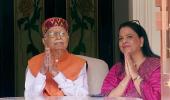President Droupadi Murmu on Saturday conferred Bharat Ratna on former prime ministers P V Narasimha Rao and Chaudhary Charan Singh, agriculture scientist M S Swaminathan and two-time former Bihar chief minister Karpoori Thakur, posthumously at the Rashtrapati Bhavan in New Delhi.

The country's highest civilian honour to Rao, Singh, Swaminathan and Thakur were received by their kin at a ceremony attended by Vice President Jagdeep Dhankhar, Prime Minister Narendra Modi and other dignitaries.
'As the ninth prime minister of India, P V Narasimha Rao led far-reaching economic reforms. Earlier, in his youth, he had taken an active part in the freedom struggle, especially against the misrule and oppression in the Nizam-ruled Hyderabad. He was known for his command over several languages and literature,' the Rashtrapati Bhavan said in a post on X.
On behalf of Rao, Bharat Ratna was received by P V Prabhakar Rao, his son, it added.
P V Narasimha Rao was prime minister from 1991 to 1996.
Often referred to as the Chanakya of Indian politics, he is known for initiating far-reaching economic reforms and for his skilful political manoeuvring.

He was the first prime minister from the south, the first Congress leader from outside the Nehru-Gandhi family to complete a full five-year term and the man who steered India through the turbulent early 1990s.
Born in an agrarian family at Karimnagar (now in Telangana), on June 28, 1921, Rao had the distinction of holding important non-economic portfolios at the Centre -- External Affairs, Defence and Home -- at different times in the 1980s. He died on December 23, 2004, at the age of 83.
In another post, the Rashtrapati Bhavan said, 'Chaudhary Charan Singh was an ardent patriot. He was imprisoned many times during the freedom struggle.
'His contribution to zamindari abolition and land reforms, and his deep understanding of the economy, especially rural and agricultural economy are respectfully remembered. His connect with farmers was legendary.'
On behalf of Chaudhary Charan Singh, Bharat Ratna was received by Jayant Chaudhary, his grandson, it added.

Chaudhary Charan Singh, a Jat leader from western Uttar Pradesh, was prime minister between July 28, 1979 and January 14, 1980. He died in 1987.
Born on December 23, 1902, at Noorpur in Meerut district of Uttar Pradesh in a middle-class family, Singh shifted to Meerut in 1929 and later joined the Congress.
President Murmu conferred Bharat Ratna upon M S Swaminathan posthumously, the Rashtrapati Bhavan said.
'Swaminathan played a major role in making India self-sufficient in food production. He is known as the 'Father of India's Green Revolution'. With his exceptional insight into the entire agricultural value chain, he guided several initiatives for research, education, and development of new varieties and methods,' it said.
Swaminathan dedicated his entire life to the goal of food and nutrition security for all.

'He was working on promoting sustainable agriculture with his vision of 'evergreen revolution',' the Rashtrapati Bhavan said.
Swaminathan's daughter Nitya Rao received the award.
Swaminathan, who died on September 28, 2023, at the age of 98, is most widely known for transforming India from a drought-stricken country dependent on the United States for foodgrain imports in the 1960s to being declared self-sufficient in food production in 1971.
Fondly addressed as MS by his friends and colleagues, Mankombu Sambasivan Swaminathan, in his long career, demonstrated what he advocated -- developing new varieties for food security -- and ensured bumper crops by working side by side with farmers.
Born in Kumbakonam in Tamil Nadu on August 7, 1925, to Dr M K Sambasivan and Parvati Thangammai, Swaminathan played a significant role in changing the trajectory of the agriculture sector when farmers were dependent on archaic farming techniques.
A former Rajya Sabha member (2007-13), Swaminathan received 84 honorary doctorate degrees from universities around the world.

About Thakur, the Rashtrapati Bhavan said.
'Shri Karpoori Thakur was a freedom fighter and a champion of equality and inclusive development. He was known for his simple living and selfless actions. On behalf of the late Shri Karpoori Thakur, Bharat Ratna was received by Shri Ramnath Thakur, his son.'
Working tirelessly to improve the lives of the disadvantaged people, Karpoori Thakur commanded high regard and had earned the honorific, 'Jan-Nayak' (people's leader), it said.
Socialist icon Thakur served as Bihar chief minister from December 1970 to June 1971 and from December 1977 to April 1979. He was a key figure in the struggle against social discrimination and inequality.
A fountainhead of OBC politics in Bihar, Thakur was born on January 24, 1924, in one of the most backward sections of society- the Nai Samaj (barber community). His political journey was marked by his unwavering commitment to the marginalised sections of society.
His tenure as the chief minister is best remembered for the implementation of the Mungeri Lal Commission recommendations, whereby quotas for backward classes were introduced in the state. He died on February 17, 1988.
This year, the government announced five Bharat Ratna awards, including one to Bharatiya Janata Party (BJP) stalwart and former deputy prime minister L K Advani.











 © 2025
© 2025